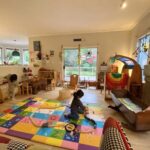From a brain science perspective, children who sometimes annoy their parents are actually exhibiting signs of a robust brain development. Thus, when noticing these four behaviors in your child, parents should quietly rejoice and provide appropriate guidance to help their children grow in the right direction.


Arguing and Refusing to Cooperate: Your Child is Starting to Have Their Own Opinions
“I don’t want to wear that dress.”
“Why should I listen to you?”
One day, parents realize their child has learned to talk back. However, don’t be upset, as from a brain development perspective, this behavior is actually positive.
After the age of three, children’s self-awareness starts to develop rapidly. At this stage, their brains work swiftly, with neural connections forming at a rapid pace.
Children start to understand: “You and I are not one entity; I am my own person.” This is a crucial stage when children develop a sense of “Who am I.” For intelligent children, this sense of self-awareness is often more pronounced and can lead to more “stubborn” reactions!
But don’t worry; your child is not intentionally being defiant. Instead, they are learning to think independently.
In fact, their seemingly confrontational behavior is not provocation but self-assertion and boundary-setting.
In this case, parents should allow children to make their own choices. This enhances cooperation and helps children feel valued. So, in this case, the better your child is at “negotiating,” the smarter they are.

After the age of three, children’s self-awareness starts to develop rapidly.

Likes to Ask Questions: Your Child’s Mind is Expanding
“Mommy, why does it rain in summer instead of snow?”
“Mom, why don’t leaves grow downwards?”
“Why can’t the pony from the park come to our house?”
Children who ask a lot of questions are not being chatty or deliberately troublesome. These questions are the sound of their developing brains.
The reason is that the prefrontal cortex, the “headquarters” responsible for thinking, reasoning, and language, is working at full speed.
For intelligent children, this stage comes earlier and is more intense. The “little gears” in their brains work 24/7.
So, their brains are working hard to make sense of the world.
If parents notice this, don’t dismiss it with responses like “I don’t know” or “Stop asking.” Instead, say, “Let’s find the answers together!” This sends a crucial signal that it’s okay for them to think and ask questions.

Children are curious and inquisitive.

Sometimes Displays Intense Emotions: Children are Born Sensitive
Some children get upset and lose their temper when they have to wait. Or they may cry, laugh, or get angry… These emotions shift rapidly. So, unintentionally, parents may think their child is fragile and weak.
In reality, children with intense emotions are often highly sensitive. In the brain, there’s an emotion-processing center called the amygdala. In sensitive children, the amygdala is more active and receives secret signals about others’ emotions faster.
As they grow up, they often display empathy and understanding, which is an advantage. But currently, they haven’t learned to express and control their emotions, so they’re more emotionally reactive and challenging to manage.
Therefore, parents should teach children to recognize and name their emotions. For example, “Are you feeling unhappy?” “Do you feel that’s unfair to you?” When children express their emotions and learn to manage these situations, they’ll be less overwhelmed by them.

Some children get upset when they have to wait.

Can’t Sit Still and Loves to Look Around: Your Child’s Brain is Busy Processing New Discoveries
At this stage, children’s brains have numerous synaptic connections and process information quickly, making them curious about everything around them. Intelligent children often have a strong focus, as their brains constantly outpace their curiosity, discovering many wonderful things in the world faster.
Children with high intelligence often display a strong curiosity, which can sometimes challenge parents’ management skills.
So, instead of asking them to sit still, give them more time and space to explore freely. Provide diverse experiences, outdoor activities, and exposure to arts and sciences. Every new experience is an opportunity for them to learn and grow.

Children with high intelligence often exhibit a strong curiosity.
Raising children is not a one-size-fits-all endeavor but a personalized journey where each child has unique needs and potential.
Behavioral and personality differences in children are a natural part of their development. Encouraging independence and critical thinking will better prepare them for future challenges. So, explore the world with your children freely and enthusiastically, fostering their confidence and creativity.
A Messy Environment Nurtures a Child’s Growing Mind: The Unseen Benefits of Clutter
“Experts in child development have long understood the impact of a child’s living and play environment on their brain development. This understanding has now been further emphasized with new research, highlighting the profound influence these spaces have on a child’s cognitive growth and overall well-being.”






































